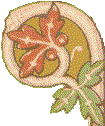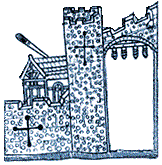
The revolt of Owain Glyndwr
Wales in 1400: 1
 Town and country
Town and countryBy 1400 the Welsh had become second-class citizens in their own country. Ever since the Edwardian conquest of 1282 they had found themselves marginalised and under pressure at almost every level of society.
One of the main sources of grievance was the development of towns, with their exclusive rights and privileges. The borough was not native to medieval Wales, but boroughs had been implanted by the Normans alongside their castles, and by 1400 had become a very divisive issue. Partly this arose from the economic monopolies that they possessed - for example, the borough of Brecon had a trading monopoly that covered the entire lordship of Brecon (similar in size to the modern county) - and partly it arose from the discriminatory laws that created a kind of medieval apartheid.
 Time and again burgesses asserted their rights
against "mere Welshmen". This was bound to cause resentment,
and it is no surprise that Glyn Dwr's initial foray in September
1400 was launched against several towns in north Wales, like
Welshpool; nor that it was so popular.
Time and again burgesses asserted their rights
against "mere Welshmen". This was bound to cause resentment,
and it is no surprise that Glyn Dwr's initial foray in September
1400 was launched against several towns in north Wales, like
Welshpool; nor that it was so popular.
Another cause of resentment was the way in which preferment in the offices of church and state often went to Englishmen. For example, of the sixteen bishops appointed to sees in Wales during the period 1372-1400, only one, John Trefor (bishop of St. Asaph in 1395), was a Welshman.